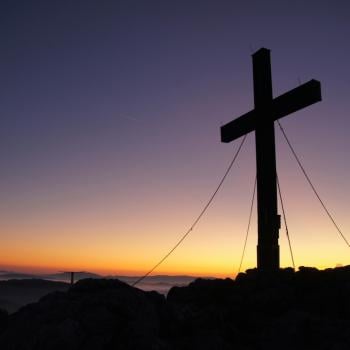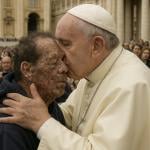The New Age Movement is one of the most powerful and surreptitious dangers to Catholics today. Sherry was someone who succumbed to the dangers of the New Age Movement. She had been raised in a Catholic family, received all the sacraments, and had even gone to Catholic school in her K-12 years. However, she never felt a personal connection with Jesus. Sherry had received the sacraments but not the Gospel. It took her until the age of 38 to recognize that she needed Jesus and began her journey back to the Catholic Church. Her story shows how many people drift away from the faith and engage in New Age practices.

Spiritual But Not Religious
The lack of personal experience of God for so many people has led to a huge uptick in the self-described “spiritual but not religious” category. They are particularly susceptible to confusions such as manifestation, crystals, enlightenment rituals, and other New Age practices. They all fail to hear in an experiential way the command that Jesus gives in today’s Gospel: “Remain in my love” (Jn. 15:9).
The Difference Between New Age and Christianity
The great difference between the New Age Movement and Christianity is that we believe in a personal God who has intervened in human history and calls us to relation with himself. The New Age Movement tends to propose the universe as an impersonal entity from which we all flow and to which we will return. What is the Incarnation? Jesus Christ, Second Person of the Trinity, becomes man. Part of the beauty of this reality is that God wants to introduce us into his own divine life.
For it was for this end that the Word of God was made man, and He who was the Son of God became the Son of Man, that man, having been taken into the Word, and receiving the adoption, might become the son of God (St. Irenaeus of Lyons, Adversus Haereses, III.19).
The Truth of Christian Doctrine
The truth of the Incarnation is an incredible reality that is available to all Christians, not just to a select few. The New Age Movement tends to focus on esoteric knowledge, just as the Gnostics did in the early centuries of Christianity. In his catechesis on St. Irenaeus of Lyons, Pope Benedict XVI taught:
Apostolic Tradition is “one”. Indeed, whereas Gnosticism was divided into multiple sects, Church Tradition is one in its fundamental content, which – as we have seen – Irenaeus calls precisely regula fidei or veritatis: and thus, because it is one, it creates unity through the peoples, through the different cultures, through the different peoples; it is a common content like the truth, despite the diversity of languages and cultures (Pope Benedict XVI, 28 March 2007).
Christ’s Gospel Commands
This leads us to another of today’s Gospel commands: “If you keep my commandments, you will remain in my love” (Jn. 15:10). This brings up the question: how do we know the commandments of God? We have Divine Revelation and Apostolic Tradition to provide the answers for us. We can once again turn to Pope Benedict XVI to help us understand Apostolic Tradition, as he leans on the teaching of St. Irenaeus.
Apostolic Tradition is “public”, not private or secret. Irenaeus did not doubt that the content of the faith transmitted by the Church is that received from the Apostles and from Jesus, the Son of God. (Pope Benedict XVI, 28 March 2007).
St. Irenaeus and Orthodoxy
St. Irenaeus lived in the second century and gave an early witness to the integrity of the faith. He had to face the Gnostic heresy, which is similar to the New Age religion in many ways. His literary masterpiece is his Against Heresies, known principally by its Latin title Adversus Haereses. In this text, he faces the false teachings of the time and re-asserts the orthodox Christian faith. In a world that focused on esoteric knowledge, he was proud to share the integrity of the faith with everyone who would listen. This focus on esoteric knowledge also links the Gnostic heresy to the New Age Movement. St. Irenaeus knew that this right doctrine comes down through the Apostles, of whom he was also a successor.
There is no other teaching than this. Therefore, for anyone who wishes to know true doctrine, it suffices to know “the Tradition passed down by the Apostles and the faith proclaimed to men”: a tradition and faith that “have come down to us through the succession of Bishops” (Adversus Haereses, 3, 3, 3-4). Hence, the succession of Bishops, the personal principle, and Apostolic Tradition, the doctrinal principle, coincide. (Pope Benedict XVI, 28 March 2007).
Our Own Challenge to Study Christian Doctrine
How much do we study Christian doctrine? I think, as Catholics, it is far too easy to reduce our living of Christianity to coming to Mass, throwing a few dollars into the collection plate while we’re there, and perhaps occasionally seeking out confession. Our faith life can and should be much richer than this, however, and we should be striving continually to grow in our knowledge, appreciation, and living of the faith. If we conform our religious practice to Catholic minimalism, we are setting ourselves up to lose the faith and drift away from the Church. Sherry got involved in Adult Religious Education at her parish and was able to find answers to many of her questions about the faith. The catechist resolved objections coming from New Age one by one.
Living Out Christ’s Commandments
In today’s Gospel, Jesus asks us to remain in his love by living out his commandments. We cannot simply “believe” and hope to be saved. Our words and behaviors should match the faith we profess. If we do not live what we believe, we will end up believing the way we live. We only need to look around to our society to see the mature fruits of such an attitude in life. We are capable of justifying any behavior in life when we allow ourselves to be separated from Christ and his teaching, which comes through Divine Revelation and Tradition entrusted to the Church.
To Love One Another As Jesus Has Loved Us
The New Age Movement has the reputation of wanting people to be “nice.” Is this the same as what happens in the Gospel when Jesus asks us to love one another as he has loved us (cf. Jn. 15:17)? Christian love, as taught by Jesus, is much deeper than what we perceive from New Age Movement teachings. To live Christian love is to have a daily conversion and to recognize our existential need for Jesus. With this love in our hearts, we experience the need to share our love of Jesus with others. A Christian who is not looking to share the love of Christ is not yet fully converted.
The New Age Movement takes up some of the Gnostic heresies from early Christianity. Now, just as then, we need faithful apologists and catechists to stand up in defense of the truth. All of us have the responsibility to grow deeper in our faith so that we are ready to respond to those who are seeking the truth. This is the way we must follow to remain in Christ’s love. Christ is calling us to a close relationship with a personal God. We should not allow ourselves to get caught up with a poor substitute like “the universe.”
What do you think? Can Catholics adopt New Age practices? Has the Church gone too far by condemning New Age ideology? Comment below.
Subscribe to the newsletter to never miss an article.


















